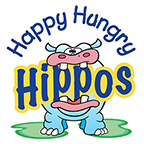Frequently Asked Questions
What is a feeding disorder?
A child with a feeding disorder has difficulties related to eating or drinking. There are many different types of feeding problems, and no two children have the exact same problem. At Happy Hungry Hippos, we are dedicated to helping children overcome their feeding difficulties and establish proper feeding and nutritional habits so that additional health problems can be avoided.
Who needs feeding therapy?
Red flags indicating a child is a candidate for a referral (Yes-if any of the following are present):
- Ongoing poor weight gain (rate re: percentiles falling) or weight loss
- Ongoing choking, gagging or coughing during meals
- Ongoing problems with vomiting
- More than one incident of nasal reflux
- History of a traumatic choking incident
- History of eating & breathing coordination problems, with ongoing respiratory issues
- Inability to transition to baby food purees by 10 months of age
- Inability to accept any table food solids by 12 months of age
- Inability to transition from breast/bottle to a cup by 16 months of age
- Has not weaned off baby foods by 16 months of age
- Aversion or avoidance of all foods in specific texture or food group
- Food range of fewer than 20 foods, especially if foods are being dropped over time with no new foods replacing those lost
- An infant who cries and/or arches at most meals
- Family is fighting about food and feeding (i.e. meals are battles)
- The parent repeatedly reports that the child is difficult for everyone to feed.
- Parental history of an eating disorder, with a child not meeting weight goals.
How common are feeding difficulties and why?
Experts estimate that nearly 25% of all children, or 80% of children with developmental delays or multiple handicaps, have feeding disorders. Eating is the most complex task that human beings engage in. It is a task that requires every one of your organ systems and requires that those systems work correctly. Every muscle in the body is involved, for example, it takes 26 muscles and 6 cranial nerves to coordinate one swallow. In addition, eating is the only task children do which requires simultaneous coordination of all 8 sensory systems.
What are common diagnoses which can contribute to feeding difficulties?
- Sensory Integration Disorder, Developmental Delay, Autism
- Aspergers, ADHD, Down's Syndrome, Prematurity, Neurological disorders
What is SOS feeding therapy ?
The SOS (sequential oral sensory) feeding program is a noninvasive developmental approach to feeding. This program is designed to assess and address all the factors involved in feeding difficulties. The focus is to improve the child’s comfort level while learning about food properties (texture, smell, taste), in a playful and non-stressful way.
The normal development of feeding is the basis of setting up treatment goals. Food Hierarchies/choices play an important role in the feeding treatment. This helps the sensory systems shift slowly into accepting new foods. This stair-step approach begins with the basic ability to tolerate the food in the room, in front of him/her, touch, smell, taste, and eventually eating new or no preferred foods.
What is Beckman Oral Motor Therapy:
Beckman Oral Motor is an intervention approach developed by Debra Beckman. The primary function of the Beckman Oral Motor approach is to improve the strength, coordination, awareness, and range of motion of the soft palate, tongue, cheeks, lips, and jaw through the use of a variety of exercises that stimulate the oral structures.
What is ARFID?
Avoidant restrictive food intake disorder (ARFID) is an eating disorder similar to anorexia. Both conditions involve intense restrictions on the amount of food and types of foods you eat. But unlike anorexia, people with ARFID aren't worried about their body image, shape, or size. Staff at Happy Hungry Hippos are equipped to treat and support children with this diagnosis.
How involved will I be in my child’s treatment session?
Parent education and involvement are essential parts of this feeding approach. A therapist works directly with the parents while they are watching each feeding session to learn this approach to feeding.
Located just off the Marietta Square in Cobb Cty, our clinic offers skilled feeding therapy by an occupational therapist.
Mailing Address
1525 Haven Crest Drive
Powder Springs, Georgia 30127
Treatment Location
20 Whitlock Pl Suite 101
Marietta, Georgia 30064
Phone: 404.933.9869
Fax: 866-430-3367
[email protected]
